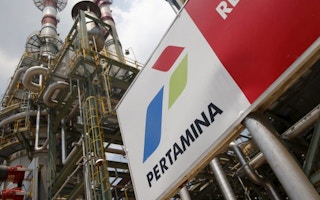Over the past year, there has been a flurry of commitments from the corporate world to cut greenhouse gas emissions. Even oil and gas companies, which are among the world’s heaviest emitters, have joined the movement to decarbonise. But Asian energy firms have been mostly quiet in the climate action conservation. Why? And how can they be nudged on to the path to net zero?
To continue reading, subscribe to Eco‑Business.
There's something for everyone. We offer a range of subscription plans.
- Access our stories and receive our Insights Weekly newsletter with the free EB Member plan.
- Unlock unlimited access to our content and archive with EB Circle.
- Publish your content with EB Premium.
Speaking at global oil and gas event IP Week on Tuesday (23 February), James Grabert, director of mitigation for the United Nations Framework Convention on Climate Change (UNFCCC), said that the region’s energy firms needed to “make their own plans” to decarbonise, while balancing the need to meet growing energy demand in the region.
Energy demand in Asia is projected to almost double by 2030, the year that global emissions need to have been halved to meet the requirements of the Paris Agreement on climate change.
“We know that in Asia [energy] demand is significant. It’s not going to be an easy path [to net zero],” said Grabert at IP Week.
The region’s energy majors, many of which are state-owned, need to work with their governments on how to align their decarbonisation plans with rising energy demand, he said.
“They need to take a proactive approach, and look at what has been done elsewhere already,” he said.
So far, only two of Asia’s oil and gas giants have established emissions targets, joining the ranks of international majors such as Shell, Total, Eni and BP, which have set decarbonisation goals in response to pressure to reduce their exposure to fossil fuels from shareholders, consumers and activists.
PetroChina, Asia’s largest oil and gas firm, announced a plan to achieve net zero emissions by 2050 in August 2020. Malaysia’s Petronas made its own 2050 net zero declaration in October.
Other Asian oil firms have made some green commitments, but none as far-reaching as a net zero target.
China’s Sinopec is working on ‘green hydrogen’ projects. Indonesian oil firm Pertamina has pledged to decarbonise in line with a state plan to cut emissions by 29 per cent by 2030.
Professor Corinne Le Quéré, a climate scientist at the University of East Anglia in the United Kingdom, said at IP Week that more net zero targets were sure to follow the 2021 United Nations Climate Change Conference, or COP26, in November.
“Governments need to go one step further [beyond net zero targets] and set implementation plans. This will send signals to companies around the world,” she said.
Le Quéré added that net zero targets needed to be toughened, with 2050 goals complemented with 2030 targets where possible, so that action was not put off until it was too late to prevent runaway climate change.
She said there would be a competitive advantage for companies that “step up early”, but more actors were needed to “bend the trajectory” and speed up progress to meet Paris Agreement 2030 climate targets.
Grabert stressed that companies needed to be making genuine, science-based commitments to net zero emissions.
“The details have to come. There is little use in targets that aren’t embedded in actual investments or actual structural changes that need to be made,” he warned.
In October, 200 companies, including oil giants Chevron, Engie and Equinor, made 2050 net zero commitments, although many were light on details as to how they would decarbonise.
To date, only two countries — the UK and France — have set legally-binding net zero targets, but more than 70 countries have made net zero commitments of some kind.
The UN’s Intergovernmental Panel on Climate Change has said that to have a 50 per cent chance of keeping global warming in check, global emissions need to reach net zero by 2050.










